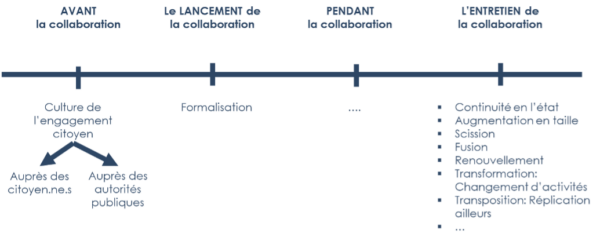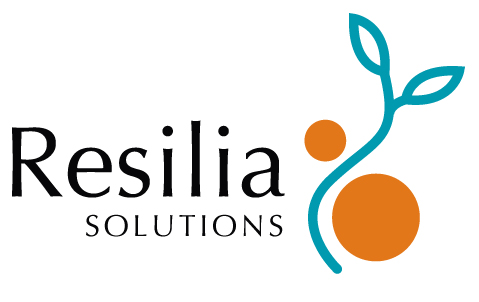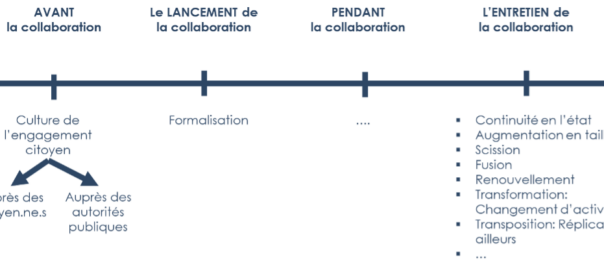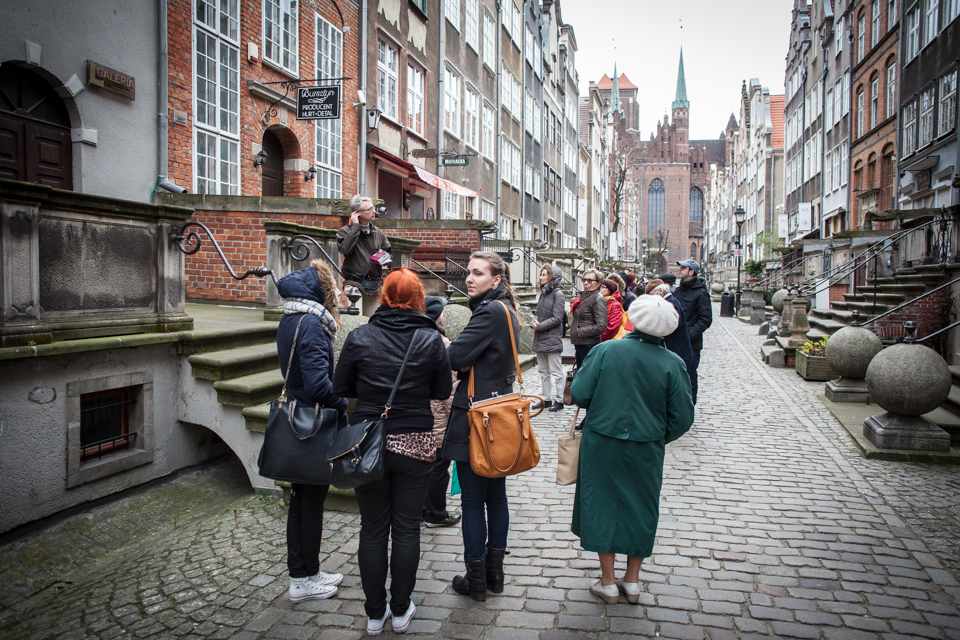Comment comprendre la collaboration entre autorités publiques et initiatives citoyennes, pour augmenter la résilience des dynamiques locales ?
Dimension 1 : La vie de la collaboration
Une collaboration entre deux acteurs a une vie : elle se prépare, se crée, elle se réalise concrètement à travers divers projets, puis évolue et s’entretient sur les longs et courts termes.

AVANT
En premier lieu, la collaboration se met en place. Elle est prédisposée par une culture de l’engagement citoyen, qui appartient tant aux citoyens qu’aux autorités publiques. Des initiatives permettent de mettre en place une première prise de connaissance, mais aussi un changement d’attitude et de paradigme pour apprendre à « faire ensemble ». Les pratiques visent pour les autorités publiques à clairement inscrire la participation et la co-création avec des citoyens dans une stratégie claire, voire à établir une unité de participation ou à intégrer clairement le rôle des citoyens dans l’organigramme administratif. Cela s’accompagne aussi de changements de fonctionnements internes (New Ways of Working), ainsi que de stimulation de l’innovation au sein même des fonctionnaires. Ce sont aussi les premiers pas pour aller les uns vers les autres : en organisant des rencontres entre citoyens et responsables politiques et administratifs.
Enfin, c’est à travers le développement d’un écosystème que la culture de la participation se développe : en travaillant avec diverses associations, en s’ancrant dans des réseaux plus larges, en favorisant les espaces de co-working ou co-associating, en organisant des universités urbaines et citoyennes et en partant à la rencontre des projets des uns et des autres.
LANCEMENT
Une fois que les premiers jalons de confiance et connaissance sont installés, la collaboration peut se formaliser à travers des projets ou initiatives concrets. Cela nécessite parfois une signature, par exemple, pour un engagement entre l’autorité publique et les citoyens (sous forme de charte) ou bien pour assurer le suivi du projet en passant d’une majorité à une autre (sous forme de convention), mais pas nécessairement. Il s’agit avant tout de « faire ensemble ».
La collaboration peut s’établir lorsque des processus sont mis en place tant au sein de l’autorité publique que des initiatives citoyennes. Les un.e.s travaillent étroitement avec des acteurs de terrain, déléguer certains de leurs tâches à des acteurs de terrain, mettre en place des postes avec une grande partie du temps sur le terrain, ou voire détacher certains de leurs employé.e.s. En interne, ils cherchent des synergies avec d’autres programmes d’activités (comme les Agendas 21) et favorisent la transversalité ; Tandis que les autres, les citoyens définiront une gouvernance claire, parfois avec la nécessité de se structurer en asbl, pour bénéficier de certaines formes de collaboration.
PENDANT
Une fois que la collaboration est mise en place, des projets peuvent être menés à bien, et des réajustements peuvent avoir lieu. Des apprentissages apparaissent. La collaboration telle qu’établie et vécu au départ évolue au gré du contexte.
Les autorités publiques centralisent la coordination pour faciliter l’interaction avec les citoyens et la rendre plus efficace.
Les citoyens organisent des réunions régulières pour se tenir au courant et agir en collectif. Ils.elles font évoluer leurs modalités de fonctionnement, par exemple en ce qui concerne la gouvernance ou la participation financière.
Des stratégies et politiques sont mises en place pour co-créer des politiques locales, de stratégies locales, des critères de budget participatif ainsi que son évaluation. Des tâches de planification urbaine sont déléguées à des citoyens et l’expérimentation a notamment lieu à l’échelle d’un (nouveau) quartier. En parallèle, l’expertise des citoyens est reconnue, voire monnayée.
La collaboration prend aussi la forme d’un accompagnement de l’autorité publique pour les initiatives citoyennes avec expertise, méthodologie, dans le montage de projets ainsi que de leur mise en œuvre. L’accompagnement peut aussi être proposé par des pairs qui ont reçu une formation.
L’ENTRETIEN
La collaboration évolue au fur et à mesure du temps. Elle est dépendante des personnes la composant, mais aussi du contexte économique, social, culturel, environnementale, … Elle s’adapte et s’ajuste. Sur le long terme elle peut rester dans un format similaire. Elle peut aussi grandir ou rétrécir (en ambition, types de projets, acteurs). Certaines activités de citoyens peuvent devenir salariées. Elle peut aussi changer complètement : se scinder en de nouvelles dynamiques ou fusionner avec d’autres. Elle peut enfin se transformer en changeant d’activité ou se transposer et se répliquer ailleurs.
Pour soutenir cette évolution, des plateformes en ligne sont mises place pour stimuler l’échange entre citoyens et autorités publiques. L’autorité publique organise aussi l’entremise entre parties prenantes, tout en reconnaissant la contribution citoyenne pour le bon fonctionnement de la ville. Cette reconnaissance peut être individuelle tout autant que collective à travers expositions ou journaux. L’autorité publique soutien aussi l’entretien de la collaboration avec un soutien diffus aux projets après leurs fins.
Dimension 2 : Les conditions de la collaboration
Afin d’évoluer dans un projet de collaboration commun, de nombreuses conditions peuvent agir à diverses étapes de la vie de la collaboration. Comme dans un couple dans lequel, par exemple, chacun des membres doit être bien en lui-même avant d’être bien avec l’autre, la collaboration nécessite que chaque acteur.rice fasse un travail interne avant de pouvoir travailler efficacement ensemble. Ce travail a lieu en amont, avant de mettre en place une collaboration, mais aussi à au lancement et pendant, par exemple, afin que les services adéquates d’une autorité publique travaillent de manière transversale pour répondre au mieux aux besoins des citoyens avec lesquels ils collaborent.
7 conditions se dégagent pour une bonne collaboration entre autorités publiques et initiatives citoyennes :
- Travailler sur soi: les acteurs de la collaboration apprennent à se consolider, à être bien en eux-mêmes avant d’être bien avec les autres, et adoptent une transition intérieure (par ex. stimuler l’innovation à tous les niveaux, établir des gouvernances et organigrammes clairs, favoriser la transversalité, identifier des financements qui permettent une forme d’autonomie, instaurer la participation, s’inscrire dans une stratégie claire)
- Mieux se connaître : les acteurs de la collaboration apprennent à se connaître et se faire confiance, directement ou avec des médiateurs (par ex. aller à la rencontre des uns et des autres, organiser des rencontres entre les citoyens et les responsables politiques, maintenir une plateforme en ligne d’échange entre citoyens et autorités publiques, établir des agents de quartier, organiser l’entremise entre parties prenantes, reconnaître la contribution citoyenne, utiliser les réseaux sociaux pour mobiliser).
- Collecter et rassembler des ressources : les acteurs de la collaboration identifient les ressources qu’ils possèdent et le mettent en commun (par ex. établir un budget participatif, louer des terrains, locaux et du matériel pour des activités ponctuelles ou récurrentes, proposer des prêts ou des dons)
- S’engager formellement: les acteurs de la collaboration formalisent leur collaboration sous forme écrite ou orale (par ex. structurer juridiquement, établir des règlements spécifiques pour l’utilisation des communs, signer une charte d’engagement entre l’autorité publique et les citoyens, signer une convention pour assurer le suivi du projet, utiliser des outils contractuels « inhabituels »)
- Co-construire les projets: les acteurs de la collaboration se projettent dans des projets communs qu’ils souhaiteraient mettre en place sur leur territoire (par ex. co-construire les critères du Budget Participatif ou une stratégie locale de résilience, co-élaborer les politiques locales, déléguer des tâches de planification urbaine à des citoyens, établir l’expérimentation à l’échelle d’un (nouveau) quartier, développer une expertise reconnue (et monnayable)
- Mener des projets: les acteurs de la collaboration mettent en œuvre des projets concrets qu’ils réalisent ensemble sur leur territoire (par ex. accompagner le montage de projets et des projets pour la méthodologie et l’administratif, travailler avec une structure intermédiaire permettant un relais avec des citoyens, centraliser l’accompagnement, former des pairs pour accompagner les citoyens au quotidien, mutualiser la quête de financements indépendants)
- Vie sociale, entourage, communauté, contexte: les acteurs de la collaboration évoluent dans une communauté et un entourage qui les nourrissent quotidiennement (par ex. créer un écosystème, créer des moments de rencontres entre acteurs de terrain, ancrer l’initiative dans un réseau plus large, créer des synergies avec associations et réseaux thématiques ou de quartier, mettre en place un espace de co-working pour repenser la ville ou une structure favorisant le développement d’un écosystème, organiser une exposition itinérante exemplifiant des projets existants, participer à une université urbaine et citoyenne, ouvrir le projet sur le quartier, publier un journal sur les initiatives locales, organiser des visites thématiques d’initiatives)


